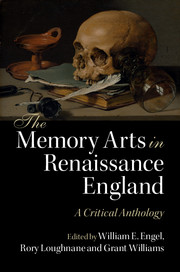Book contents
- Frontmatter
- Dedication
- Contents
- List of figures
- Acknowledgements
- A note on abbreviations
- Introduction
- PART I The art of memory
- PART II Rhetoric and poetics
- PART III Education and science
- PART IV History and philosophy
- PART V Religion and devotion
- PART VI Literature
- Introduction to Part VI
- POETRY
- VI.1 John Skelton, ‘Upon a Dead Man's Head’ (1527)
- VI.2 Edmund Spenser, The Faerie Queene (1590)
- VI.3 Anthony Sherley, Wit's New Dial (1604)
- VI.4 Richard Niccols, Mirror for Magistrates (1610)
- VI.5 Abraham Holland, ‘A Funeral Elegy’ (1626)
- VI.6 George Herbert, The Temple (1633)
- VI.7 Francis Quarles, Emblems (1635)
- VI.8 Mary Fage, Fame's Rule (1637)
- VI.9 Margaret Cavendish, selected works
- VI.10 John Milton, Paradise Lost (1674)
- PLAYS AND PROSE
- Index
- References
VI.9 - Margaret Cavendish, selected works
from POETRY
Published online by Cambridge University Press: 05 August 2016
- Frontmatter
- Dedication
- Contents
- List of figures
- Acknowledgements
- A note on abbreviations
- Introduction
- PART I The art of memory
- PART II Rhetoric and poetics
- PART III Education and science
- PART IV History and philosophy
- PART V Religion and devotion
- PART VI Literature
- Introduction to Part VI
- POETRY
- VI.1 John Skelton, ‘Upon a Dead Man's Head’ (1527)
- VI.2 Edmund Spenser, The Faerie Queene (1590)
- VI.3 Anthony Sherley, Wit's New Dial (1604)
- VI.4 Richard Niccols, Mirror for Magistrates (1610)
- VI.5 Abraham Holland, ‘A Funeral Elegy’ (1626)
- VI.6 George Herbert, The Temple (1633)
- VI.7 Francis Quarles, Emblems (1635)
- VI.8 Mary Fage, Fame's Rule (1637)
- VI.9 Margaret Cavendish, selected works
- VI.10 John Milton, Paradise Lost (1674)
- PLAYS AND PROSE
- Index
- References
Summary
About the author
Margaret Cavendish (1623–73) met and married William Cavendish, the banished Marquis of Newcastle, while in exile. Her marriage introduced her to prominent scientists and intellectuals, kindling her own authorial ambitions, which span an impressive range of genres from literature to biography and scientific treatise. She is the only seventeenth-century woman to publish books on natural philosophy.
‘ The Elysium’
About the text
Cavendish's first publication and only book of poetry deals with a quirky array of topics from science, ethics and polite society to mentation and the poetic process. A proportion of the first edition's poems describe her slant on atomism, the theory that all things in the cosmos consist of minute indivisible – literally uncuttable – particles. Her engagement with atomism aroused controversy at the time since this materialist theory smacked of atheism, deriving from Lucretius's scandalous On the Nature of Things. The volume's poems are loosely organised into sections, each of which has a preface addressed to a particular profile of reader, such as natural philosophers. ‘Elysium’ appears in the group of poems prefaced by a letter to ‘all writing ladies’. In this preface Cavendish urges her fellow women to take advantage of the permissible age by seeking out honour so that they will not be reduced to forgotten dust: ‘But let us strive to build us tombs while we live, of noble, honourable, and good action, at least harmless: That though our bodies die, / Our names may live to after memory’ (Aav).
The arts of memory
The poem picks up on two preoccupations with remembering found throughout Cavendish's work. First, it vaunts the power of a writer's fame – no less a female writer's – to defeat oblivion, an ambition that the prolific Cavendish continually voiced. Second, it explores cognition as a habitable territory, landscape, or building. Generally speaking, Cavendish was intrigued by spatialising the mind's faculties through similitudes and allegories, both in prose and poetry. Her constructs are in effect memory palaces of interiority. Indeed, this poem may also recall an actual palace as well as the classical afterworld: William's bedchamber at Bolsover Castle had two closets, one called Heaven and the other Elysium, a private study space in which he would write.
Textual notes
Poems, and fancies written by the Right Honourable, the Lady Margaret Newcastle (London, 1653), Aa3r–Aa3v.
- Type
- Chapter
- Information
- The Memory Arts in Renaissance EnglandA Critical Anthology, pp. 311 - 316Publisher: Cambridge University PressPrint publication year: 2016



